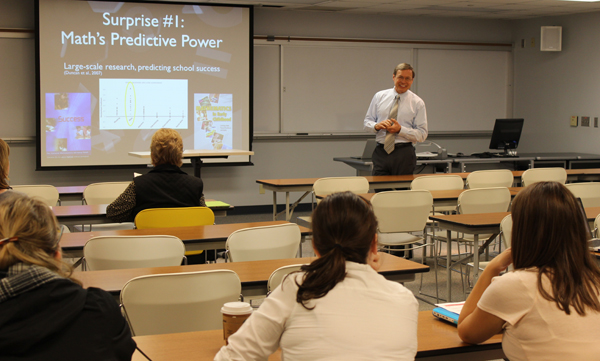
In his presentation on Oct. 7 of his "Lessons from Research," Dr. Doug Clements of the University of Denver discussed surprising findings in early childhood mathematics education.
Clements, along with his wife, Dr. Julie Sarama, both Kennedy Endowed Chairs and Professors in the Morgridge College of Education, are the developers of a curriculum called "Building Blocks - Foundations for Mathematical Thinking, Pre-Kindergarten to Grade 2: Research-based Materials Development," through the National Science Foundation. Over the years, research has found early childhood math education to be surprisingly important. As follows are Clements’ "surprises" (see link to PDF for citations of the research):
Surprise #1: Math's Predictive Power
Math is the best predictor of school success due to mathematical thinking being cognitively foundational. Preschool math knowledge predicts achievement even into high school and also predicts later reading achievement.
Surprise #2: Children's Math Potential
Children can possess an informal knowledge of mathematics that is amazingly, broad, complex and sophisticated. For example, preschoolers can learn to invent solutions to solve simple arithmetic problems.
Surprise #3: Educators Underestimate
Teachers vastly underestimate what their children know and can learn. Teachers should challenge their students, for they might be surprised that it wasn’t a challenge at all.
Surprise #4: Math Interventions for All
All but the top 1 percent to 2 percent of students come to school needing to learn more. Students all need structured opportunities to learn mathematics deeply.
Surprise #5: We Know a Lot
We know a lot about how to use learning trajectories to synthesize our knowledge about how children learn math into effective interventions for children. Mathematics and play do support each other. Early childhood programs that have more mathematics have more higher-level free play, all of which promotes self-regulation and executive function.
See the PDF at this link for more:
http://go.unl.edu/clements